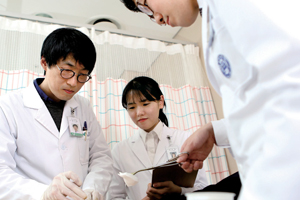PNU FOCUS Dynamic Development of Pusan National University
- 1The Era of Yangsan Campus
- 2PNU establishes specialized campus belt
- 3PNU hosts School of Oriental Medicine and School of Law
- 4PNU strengthens research competitiveness and increases support for each campus to develop their areas of specialty
- 5PNU runs Global Studies Program
- 6Global cooperation projects between industry and academia
PNU hosts School of Oriental Medicine
and School of Law

PNU hosts School of Oriental Medicine

Opened in 2008, to lead the science-based industrialization and globalization of oriental medicine
Pusan National University is the only university designated by the government to open a School of Oriental Medicine. PNU opened the School in 2008, which is expected to expand healthcare services for all of Korea, while leading the science-based industrialization and the globalization of oriental medicine
The School of Oriental Medicine will be a stronghold that can contribute to improving the healthcare industry, an objective that is being pursued nationally. The School focuses on R&D in the area of oriental medicine, unlike other colleges of oriental medicine that exist in private universities.
Furthermore, PNU's Yangsan Campus also features the School of Medicine, the School of Dentistry, the College of Nursing, Pusan National University Yangsan Hospital, the Dental Hospital, and the Children's Hospital. In combination with the other facilities on Yangsan Campus, the School of Oriental Medicine will play a leading role in PNU’s hub of healthcare and life sciences, through collaborations between oriental medicine and Western medicine. Based on this infrastructure, PNU will lead research and development in the field to promote scientific research, which will be utilized to enable the industrialization of oriental medicine.
In addition, to promote the globalization of oriental medicine, PNU is actively pursuing international exchanges and engaging in industrial-academic cooperation with China Medical University, Beijing University of Chinese Medicine, Shenyang College of Pharmacy, Toyama University of Japan, and the Fraunhofer Institute (Germany). Through these efforts, PNU is establishing an international cluster in the field of healthcare and life sciences that encompasses academia, research institutes, and industry, by leading international joint research and industrialization of oriental medicine.
PNU hosts School of Law

In March 2009, PNU's School of Law welcomed its first 120 students. The School will specialize in finance, marine transportation and commerce. With financial institutions such as Korea Exchange (KRX) choosing to move to Pusan, the geographical advantage of Pusan as the largest port in Korea, and PNU's scholastic capacity, PNU Law School will become an incubator for legal professionals in the fields of finance, marine transportation and commerce. To provide on-the-job experience, offer diverse education, and ensure high-quality instruction, PNU Law School has recruited 39 full-time faculty members, including 11 who have worked as judicial officers. PNU plans to maintain the number of students per faculty member at 8.3. The School of Law building is equipped with a cutting-edge lecture hall, a data search center, a moot court, a law library, and many other educational facilities
